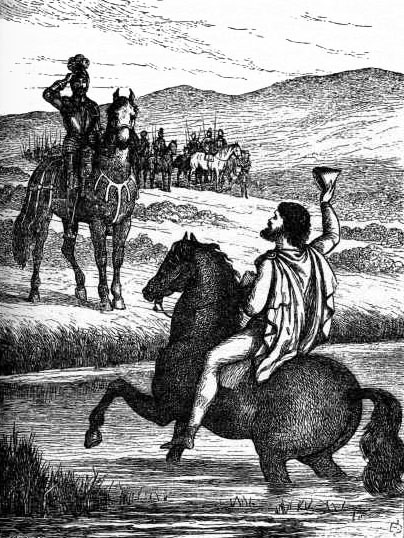Hugh O'Neill
Essex arrived on the 15th of April, 1599. He had an army of 20,000 foot and 2,000 horse—the most powerful, if not the best equipped force ever sent into the country. He at once issued a proclamation, offering pardon to all the insurgents who should submit, and he despatched reinforcements to the northern garrison towns, and to Wicklow and Naas. He then marched southward, not without encountering a sharp defeat from Rory O'More. He attacked the Geraldines, without much success, in Fermoy and Lismore, having, on the whole, lost more than he had accomplished by the expedition. An engagement took place between O'Donnell and Sir Conyers Clifford, in the pass of Balloghboy, on the 16th of August, in which Conyers was killed, and his army defeated. His body was recognized by the Irish, towards whom he had always acted honorably, and they interred the remains of their brave and noble enemy with the respect which was justly due to him.

Interview between Essex and O'Neill
Essex wrote to England for more troops, and his enemies were not slow to represent his incapacity, and to demand his recall; but he had not yet lost grace with his royal mistress, and his request was granted. The Viceroy now marched into the northern provinces. When he arrived at the Lagan, where it bounds Louth and Monaghan, O'Neill appeared on the opposite hill with his army, and sent the O'Hagan, his faithful friend and attendant, to demand a conference. The interview took place on the following day; and O'Neill, with chivalrous courtesy, dashed into the river on his charger, and there conversed with the English Earl, while he remained on the opposite bank. It was supposed that the Irish chieftain had made a favourable impression on Essex, and that he was disposed to conciliate the Catholics. He was obliged to go to England to clear himself of these charges; and his subsequent arrest and execution would excite more sympathy, had he been as amiable in his domestic relations as he is said to have been in his public life.
Ulster enjoyed a brief period of rest under the government of its native princes. In 1600 O'Neill proceeded southward, laying waste the lands of the English settlers, but promoting the restoration of churches and abbeys, and assisting the clergy and the native Irish in every possible way. Having lost Hugh Maguire, one of his best warriors, in an accidental engagement with St. Leger, the President of Munster, he determined to return to Ulster. A new Viceroy had just arrived in Ireland, and he attempted to cut off his retreat ineffectually.
O'Neill had now obtained a position of considerable importance, and one which he appears to have used invariably for the general good. The fame of his victories [3] had spread throughout the Continent. It was well known now that the Irish had not accepted the Protestant Reformation, and it appeared as if there was at last some hope of permanent peace in Ireland.
Notes
[3] Victories.—The victory of the Blackwater was hailed with salvos of artillery from S. Angelo. The Pope and Philip III. of Spain corresponded with O'Neill constantly, the one about the affairs of the Church, the other with generous offers of assistance. At one time the Emperor sent him 22,000 crowns of gold.
